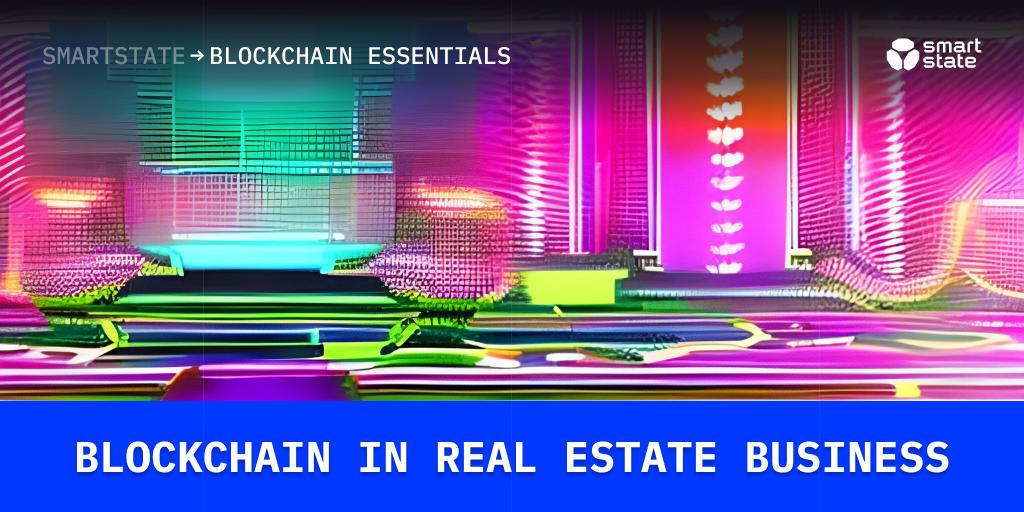Blockchain in real estate business
Blockchain continues embracing more and more spheres of human life, coming into such seemingly casual and familiar aspects as household. It is interesting how it could have happened and what they might have in common. How may blockchain technology change those industries for the better and make it more convenient? Let us take a closer look.
Blockchain in real estate
No wonder that real estate involves huge sums of money and large properties, which, along with the rights of the owners, need protection. Clients are looking for convenience, security and comfort that new technologies might grant them. And certainly, all parties involved in the process do not want to deal with complications, which real estate faces all the time, such as loads of paperwork, painstakingly slow procedures or multiple intermediaries which increase the possibility of an error and brings the level of security down.
What are the main issues that blockchain can help out with and how can it happen?
Overloads by paperwork are one of the main scourges of real estate. It takes long to make a transaction of property properly, the process is complex and common (or even special) software tools do not speed it up. Another issue is the low transparency level. All necessary data, needed for selling or buying property, is stored in different places and it is quite hard to collect it with traditional methods. The blockchain technology may help to resolve this issue, allowing the companies to get rid of a notable amount of paper and offering a solution of keeping all important data in one secure place. Blockchain also offers high transparency which makes real estate solutions via blockchain technologies more secure and trustworthy.
Another huge issue of the real estate trading process is the number of intermediaries which are inevitable in traditional schemes. As a result not only is security under threat. The whole transaction process slows down dramatically. The blockchain technology does not need a third party to get involved (or a fourth, fifth, etc.). It helps to reduce the number of intermediaries to almost none and make transactions themselves much faster and, which is also important, more secure.
To sum it all up, what are the biggest benefits that blockchain technology can grant to the real estate business?
- Tokenization. Tokenization is a popular aspect, which unites blockchain technology and real estate to make the latter more convenient and attractive. Shares of real estate assets can be wrapped in tokens and later can be bought, sold and transferred through blockchain platforms. The speed of property sales goes up and they become more secure. It helps to reduce barriers for any property estate, including foreign, as the property can be traded like stocks or other tokens with cryptocurrency.
- Smart contracts. Smart contracts can be used not only in the financial and banking spheres, but in the real estate business, too. They play a huge role in property transactions making them easier, more transparent and secure. Smart contracts do not need any human interaction, the process is completely automated, which leads to reducing efforts, the possibility of errors and chances of fraud.
- Security control. Fraud is a notoriously common practice in real estate business, when some person sells property to another person and they know practically nothing of each other. A third party (an intermediary), who helps to complete the deal, is a reason for concern. Blockchain eliminates the intermediary and makes the deal more transparent and secure. The same refers to the financial side. Using blockchain technology instead of traditional methods allows streamlining payments and makes the transactions (both of property and payments) much more secure. This scheme brings the possibility of fraud or error to zero.
- Automation. Not only the amount of paperwork, but any manual work can be reduced with the help of blockchain technology. All heavy and complicated tools can be replaced by one decentralized application, which contains specific smart contracts for real estate. The process will be automated and, as a result, simplified and more efficient. Human factors, which may cause possible mistakes, will be taken out of the process. And it will bring down the cost, as there will be no expenses on additional staff.
- Working with data. All the data on the blockchain referring to property, transaction or property history is recorded and can be available at any time to owners or customers. No data is obscure for both parties and the deal may be agreed and completed without the common issues (like time consuming administrative protraction and bureaucracy). Estate companies also may have access to client’s data necessary to complete the deal (for example, their credit history), which almost eliminates the possibility of fraud.
Closing thought
Traditional websites and applications, dedicated to the real estate business (trading or renting) are rather complicated and may be user-unfriendly. The information is not updated on-time quite often, might be incomplete, which misleads possible clients and distracts them from using network applications or sites. Integrating blockchain technologies in a business which has taken off not long ago will help to solve the problem. The data will be stored in a decentralized database, once being recorded, and accessible for all parties interested in completing the deal. The data will be encrypted by means of a hash algorithm, which provides the necessary transparency (which does not usually exist in traditional markets), protection of all the transaction details (keeping them secure and bringing the possibility of stealing personal data to zero). The data is not stored in one place and not a single authority or a group takes hold of it, which also helps to secure personal and transaction data and prevent stealing or fraud.

